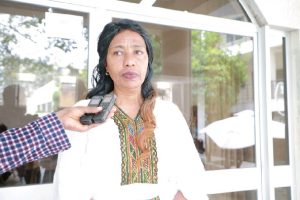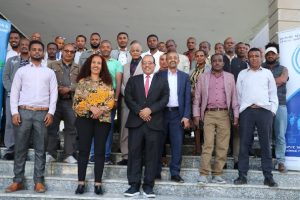
ADDIS ABABA– Consistent gender data collection is vital for accelerating Sustainable Development Goals (SDGs) and supporting evidence-based decision-making, the African Institute for Development Policy (AFIDEP) said.
At a recent landscape assessment workshop on the gender data and decision-making ecosystem in Ethiopia, AFIDEP Research and Policy Analyst Violet Murunga (PhD) highlighted the organization’s efforts to help the Ethiopian government bridge gender data gaps between research, policy, and practice. AFIDEP has been assisting in identifying, analyzing, and utilizing existing research and data to support the decision-making process with solid evidence.
Murunga underscored the importance of strengthening the policy environment around gender data in Ethiopia, particularly in terms of government departments, structures, and infrastructure. These would be crucial for collecting, storing, and analyzing gender data effectively, she said. Implementing a robust gender data ecosystem, she noted, would significantly contribute to achieving the SDGs and improving the decision-making process.
While Ethiopia values the gender data agenda, research findings reveal that the country is not investing adequate resources to generate the evidence required to inform decisions and devise effective solutions. Key challenges include limited technical capacity, a lack of awareness, insufficient budget allocations, and the Ministry of Women and Social Affairs’ (MoWSA) inability to mandate institutions to contribute gender data due to a lack of authority.
AFIDEP Study Research Assistant BinyamGintamo (PhD) also stressed the critical role of gender data collection in tracking and evaluating SDG progress. Although Ethiopia has mainstreamed gender data collection efforts since adopting the 2030 Agenda for Sustainable Development, data gaps persist.
“Efficient gender data collection is essential for identifying development challenges and gender equality gaps, designing impactful strategies, tracking SDG progress, monitoring, evaluation, advocacy, and influencing policy toward gender equality,”Binyam explained. However, he pointed out that the collection efforts depend on institutional priorities and programmatic focus.
Despite some institutions actively collecting gender data, others have yet to contribute to this crucial agenda. The absence of a coordinated, accountable institution responsible for collecting gender data, coupled with challenges like a lack of coordination, awareness, infrastructure, and institutional power, has hindered Ethiopia’s progress in this area, the researcher concluded.
BY TSEGAYE TILAHUN
THE ETHIOPIAN HERALD SATURDAY 5 OCTOBER 2024





